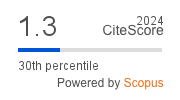The role of Kuniran (U. moluccensis) and Gurami (O. goramy) fish thorns and scales in increasing salivary leukocyte and monocyte cells viability against Streptococcus mutans
Downloads
Downloads
Badan Penelitian dan Pengembangan Kesehatan. Riset Kesehatan Dasar 2018. Jakarta: Kementerian Kesehatan Republik Indonesia; 2018.
Lockhart PB, Brennan MT, Thornhill M, Michalowicz BS, Noll J, Bahrani-Mougeot FK, Sasser HC. Poor oral hygiene as a risk factor for infective endocarditis–related bacteremia. J Am Dent Assoc. 2009; 140(10): 1238–44.
Nomura R, Nakano K, Nemoto H, Fujita K, Inagaki S, Takahashi T, Taniguchi K, Takeda M, Yoshioka H, Amano A, Ooshima T. Isolation and characterization of Streptococcus mutans in heart valve and dental plaque specimens from a patient with infective endocarditis. J Med Microbiol. 2006; 55(8): 1135–40.
Yamamoto K, Igawa K, Sugimoto K, Yoshizawa Y, Yanagiguchi K, Ikeda T, Yamada S, Hayashi Y. Biological safety of fish (tilapia) collagen. Biomed Res Int. 2014; 2014: 1–9.
Abdullah FN, Solichin A, Saputra SW. Aspek biologi dan tingkat pemanfaatan ikan kuniran (Upeneus moluccensis) yang didaratkan di tempat pelelangan ikan (TPI) Tawang Kabupaten Kendal Provinsi Jawa Tengah. Manag Aquat Resour J. 2015; 4(2): 28–37.
Budi DS, Alimuddin, Suprayudi MA. Growth response and feed utilization of giant gourami (Osphronemus goramy) juvenile feeding different protein levels of the diets supplemented with recombinant growth hormone. HAYATI J Biosci. 2015; 22: 12–9.
Jeevithan E, Qingbo Z, Bao B, Wu W. Biomedical and pharmaceutical application of fish collagen and gelatin: a review. J Nutr Ther. 2013; 2(4): 218–27.
Duan R, Zhang J, Du X, Yao X, Konno K. Properties of collagen from skin, scale and bone of carp (Cyprinus carpio). Food Chem. 2009; 112(3): 702–6.
Herpandi, Huda N, Adzitey F. Fish bone and scale as a potential source of halal gelatin. J Fish Aquat Sci. 2011; 6(4): 379–89.
Nanyang Technological University. Scientists discover fish scale-derived collagen effective for healing wounds. ScienceDaily. 2018. Available from: www.sciencedaily.com/releases/2018/03/180312091405.htm. Accessed 2018 Sep 19.
Zhou G, Zhang G, Wu Z, Hou Y, Yan M, Liu H, Niu X, Ruhan A, Fan Y. Research on the structure of fish collagen nanofibers influenced cell growth. J Nanomater. 2013; 2013: 1–6.
Single A, Beetham H, Telford BJ, Guilford P, Chen A. A comparison of real-time and endpoint cell viability assays for improved synthetic lethal drug validation. J Biomol Screen. 2015; 20(10): 1286–93.
Kwolek-Mirek M, Zadrag-Tecza R. Comparison of methods used for assessing the viability and vitality of yeast cells. FEMS Yeast Res. 2014; 14(7): 1068–79.
Hanura AB, Trilaksani W, Suptijah P. Characterization of nanohidroxyapatite from tuna's Thunnus sp bone as biomaterials substance. J Ilmu dan Teknol Kelaut Trop. 2017; 9(2): 619–29.
Histopaque®-1119 sterile-filtered, density: 1.119 g/mL | Sigma-Aldrich. Protocols & Articles section. Available from: https://www.sigmaaldrich.com/catalog/product/sigma/11191?lang=en®ion=ID. Accessed 2018 Sep 19.
Nakanishi T, Takegawa D, Hirao K, Takahashi K, Yumoto H, Matsuo T. Roles of dental pulp fibroblasts in the recognition of bacterium-related factors and subsequent development of pulpitis. Jpn Dent Sci Rev. 2011; 47(2): 161–6.
Jiang W, Lv H, Wang H, Wang D, Sun S, Jia Q, Wang P, Song B, Ni L. Activation of the NLRP3/caspase-1 inflammasome in human dental pulp tissue and human dental pulp fibroblasts. Cell Tissue Res. 2015; 361(2): 541–55.
Farges JC, Alliot-Licht B, Renard E, Ducret M, Gaudin A, Smith AJ, Cooper PR. Dental pulp defence and repair mechanisms in dental caries. Mediators Inflamm. 2015; 2015: 1–16.
Yumoto H, Hirao K, Hosokawa Y, Kuramoto H, Takegawa D, Nakanishi T, Matsuo T. The roles of odontoblasts in dental pulp innate immunity. Jpn Dent Sci Rev. 2018; 54(3): 105–17.
Faidah N, Hernawati T, Lamid M, Ismudiono I, Suprayogi TW, Mulyati S. Increased integrity of plasma membrane and acrosome cap spermatozoa limousin cattle at post thawing in frozen media by adding seawater extract. KnE Life Sci. 2017; 3(6): 633–41.
Rizal M, Herdis. Peranan antioksidan dalam meningkatkan kualitas semen beku. Wartozoa. 2010; 2(3): 139–45.
Duarte J, Francisco V, Perez-Vizcaino F. Modulation of nitric oxide by flavonoids. Food Funct. 2014; 5(8): 1653–68.
Sakai C, Ishida M, Ohba H, Yamashita H, Uchida H, Yoshizumi M, Ishida T. Fish oil omega-3 polyunsaturated fatty acids attenuate oxidative stress-induced DNA damage in vascular endothelial cells. Minamino T, editor. PLoS One. 2017; 12(11): 1–13.
- Every manuscript submitted to must observe the policy and terms set by the Dental Journal (Majalah Kedokteran Gigi).
- Publication rights to manuscript content published by the Dental Journal (Majalah Kedokteran Gigi) is owned by the journal with the consent and approval of the author(s) concerned.
- Full texts of electronically published manuscripts can be accessed free of charge and used according to the license shown below.
- The Dental Journal (Majalah Kedokteran Gigi) is licensed under a Creative Commons Attribution-ShareAlike 4.0 International License

















